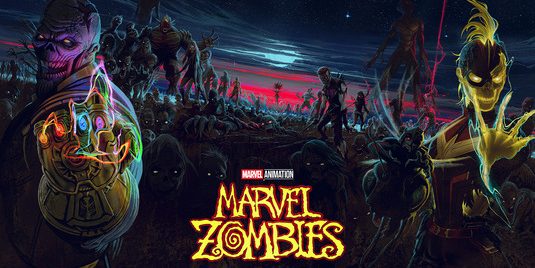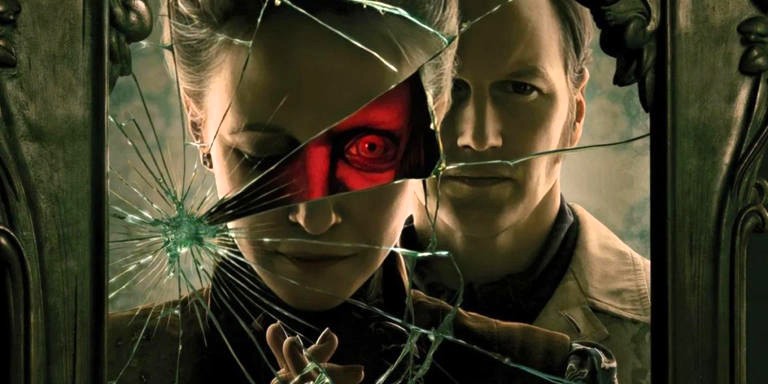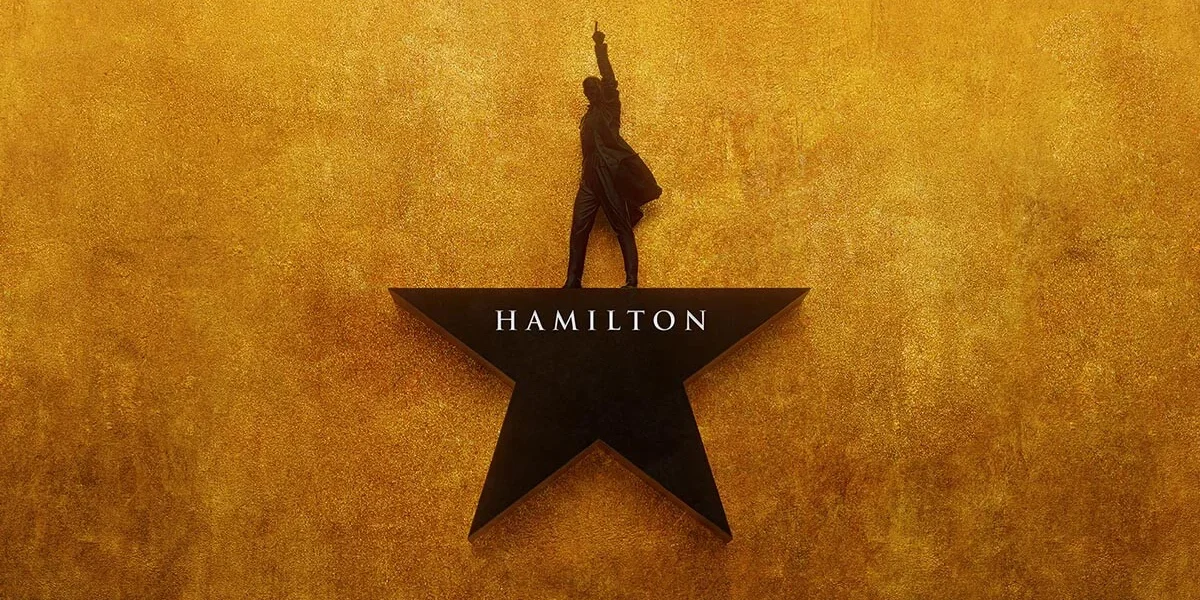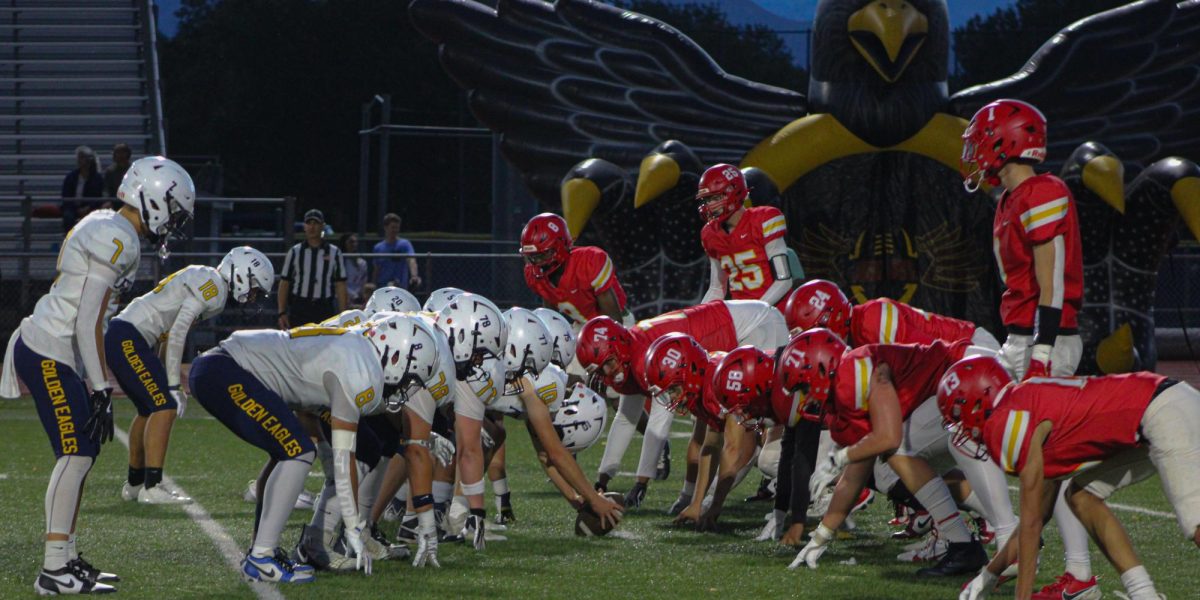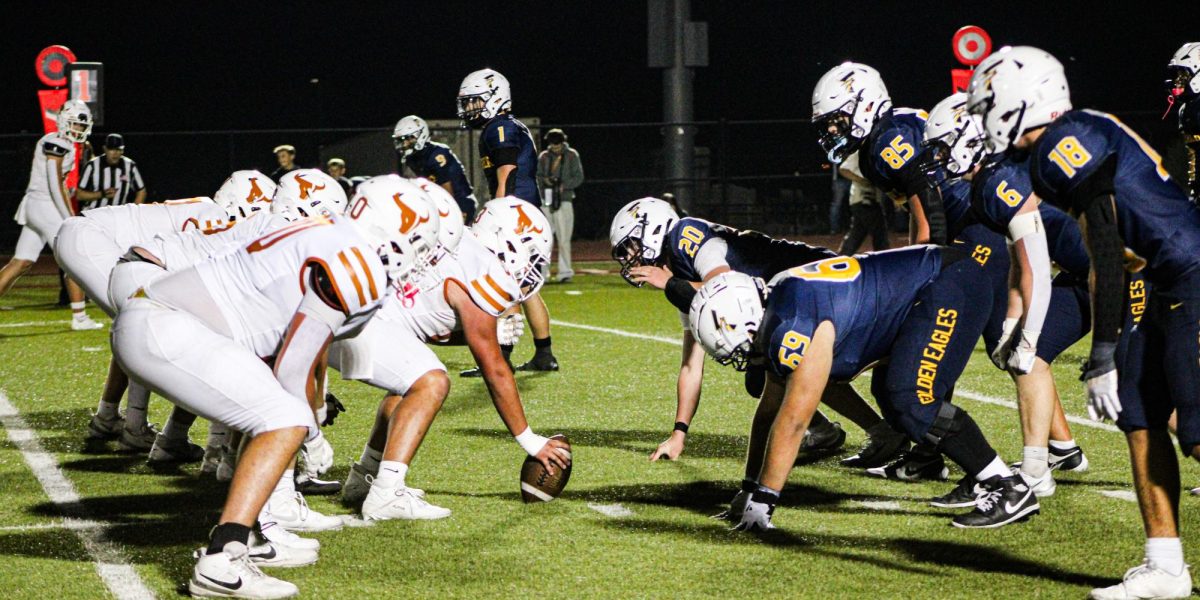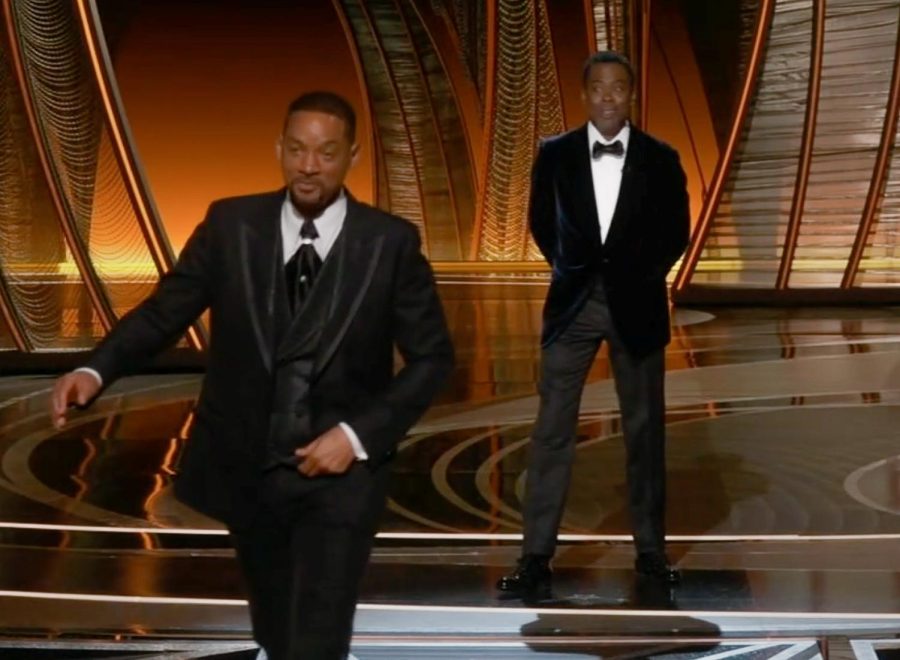The 94th Oscars Get Out of Hand
A laugh, a slap, a threat–this is what happened at the 2022 Academy Awards and why it matters
Courtesy of Reuters (Brian Snyder, photographer)
Will Smith walks away from a smiling and preening Chris Rock just moments after he assaulted the man on live television. The event has caused an uproar not just in Hollywood but all over the nation over who’s to blame for the situation. The debate and its importance to so many people, including those in our community, shows how society is still working on how to handle people who both verbally and physically attack others.
March 29, 2022
This past Sunday was the Academy Awards, which honors the films of the past year with golden Oscars. Yet winning films were not the main focus of the evening after an altercation. Will Smith, who is best known for his roles in films like Men in Black, The Pursuit of Happyness, I Am Legend, and King Richard, took the stage unannounced and open-palmed slapped comedian Chris Rock on live television. That single act has led to debate all around the school, the film industry, and the entire country around who’s in the right when it comes to hurting others.
Here’s what happened: Rock was presenting the award for Best Documentary, chosen from among others in the film industry to present an award because he is well-known and funny. Before presenting the award, he joked about different celebrities in the audience, like Javier Bardem and his wife Penelope Cruz, before talking about Smith and his wife Jada Pinkett Smith. Rock then said, “Jada, I love you. GI Jane 2, can’t wait to see you,” playing off the fact that Pinkett Smith has shaved her head bald like the title character in the 1997 film G.I Jane. Pinkett Smith was visibly upset, as she has a condition called alopecia that causes hair loss, and she has been very public about how she’s shaved her head to manage it and how the loss of her hair has hurt her.
Jada Pinkett Smith poses in her green Dolce and Gabbana dress beside her husband Will at the Oscar Red Carpet ceremony before the awards show. Pinkett Smith has been open about her struggles with alopecia since she went public with her diagnosis in 2018, and is one of the top advocates for alopecia research. (Courtesy of WireImages)
While some in the audience laughed at the jab, many booed, causing Rock to hold out his hands in disbelief at the negativity and said, “It’s a gentle rib. That was a nice one. I’m out here–”
He cut off his defense of himself and said, “Uh oh” when Smith took the stage, walked up to a laughing Rock, and quickly struck him in the face with his right hand before turning around and returning to his seat. While he stumbled, Rock kept on his feet and kept laughing, saying “Wow. Will Smith just smacked the [explitive] out of me.”
Seeing that Rock was clearly still laughing and not taking the matter seriously, Smith yelled out twice at the comedian to “Get my wife’s name out of your [explitive] mouth.” Rock then said, “I’m going to, okay” before declaring the incident the “greatest night in the history of television” and moving on to read the nominees and winner of the Best Documentary Oscar.
As the night went on, there was a palpable tension in the room as some presenters (like cohost Amy Schumer) kept mentioning the incident while others seemed to be shaken by what had happened. A few minutes after the slap heard around the world, the incident would be tackled head-on when Smith won the Best Actor Oscar for his role in King Richard, a film about the obsessive and ego-driven father of tennis stars Venus and Serena Williams (you can read our review of the film here). Smith, who had by then been calmed down by fellow stars Denzel Washington and Bradley Cooper and who had spoken extensively with his publicist, compared his outburst to the character of Richard Williams that he played and how “love can make you do crazy things.” He then apologized to the audience and to the Academy for his behavior and issued a public apology to Rock the next day.
The incident may have happened in Los Angeles, but it has been the talk of the student body of Frederick High for the past couple of days. Everyone seems to have an opinion on the matter, and that’s not hyperbole: when asking students what they thought about the matter, we got more quotes than we could ever put in a single article. Some like sophomore Payton Shelley liked how Smith defended his wife’s honor, saying “That was amazing.” Some sided with sophomore Kaitlyn Smith, who said, “It was a little unnecessary–violence is never the answer.” Sophomore Maddox Peinado and some of his friends went all-in to defend Chris Rock, saying “[he] didn’t know about her condition. He made a harmless joke, and Will Smith also found it funny until he looked over. She (Jada) cheated on him as well.”
In all our surveys, no one we could find told us that they didn’t care or that the incident didn’t matter. Why is that? One, both Rock and Smith are charming celebrities with big followings, so both are really well known. But more than celebrities, they are role models. While movies, TV, and video games don’t really influence how someone thinks or behaves, watching how their role model acts and reacts in situations does. The reason so many students in a town a thousand miles away from Hollywood care so much is because each is thinking, What would I do in that situation? What’s the right answer?
So we have Chris Rock vs. Will Smith–who was right and who was wrong? Well…
Chris Rock Was in the Wrong
Consider what would have happened if Will Smith hadn’t left his seat to assault another man. Rock was already being booed for such a tasteless joke–he would have received backlash from the press and his fans and may have even been canceled. The problem with the joke is that Chris Rock was “punching down,” a term in comedy that refers to picking on those weaker or more disadvantaged than you.
Imagine a student calling a teacher “too strict to be a good teacher”– this comes from a place of frustration with the teacher’s behavior and, since the teacher has all the power, this criticism is “punching up” and isn’t considered a big issue. But imagine a teacher called a student “too dumb to learn anything”–this statement from someone with power to someone without power could be devastating and scar that person for life.
Power dynamics in speech can be tricky. For example, if a student calls a teacher “an ugly, bald fatso,” that’s punching down and is considered bad. Sure, the teacher has power over the student, but in this case, the student is making fun of the teacher for things they have may no control over like appearance, weight, or hair loss. After the incident, Chris Rock told TMZ that he had “no idea” about Jada’s medical condition, but this isn’t an excuse. Even if Pinkett had no medical condition and just shaved her head as a personal choice, Rock should not have made fun of her appearance. It wasn’t necessary, especially for a bad joke about a 25-year-old movie that wasn’t relevant to anything.
To make fun of someone based on how they look is classic bullying and it’s unfortunately something students encounter regularly at school. “I’ve called home about so many students fat-shaming other students this year that I’m disgusted,” said Mrs. Jennifer Tayler, an English teacher at Frederick High. Lots of those interviewed who had told us that Chris Rock was in the wrong talked about how cruel being shamed could be. Rock told Smith, “Wow dude, it was a G.I Jane joke” after he was hit, but jokes can sometimes be more painful than a slap, as it can drive someone to a disorder (such as anorexia or paranoia), depression, self-harm, or even suicide. Just because Rock didn’t mean to hurt anyone’s feelings doesn’t mean feelings weren’t hurt–Pinkett Smith was very upset and Smith had tears in his eyes when yelling at Rock. Words have consequences, and while there’s a lot that can be said about the choices and behavior a person has, how they look should be off-limits even in humor.
So if Rock was wrong, does that mean Will Smith was right to slap him and defend his wife’s honor? Well…
Will Smith Was Also in the Wrong
Will Smith (center) poses with his wife Jada (far left), daughter Willow (left), and sons Jaden (right) and Trey (far right) after his Oscar win and controversial assault. His family supported Smith in the immediate aftermath of the Oscars scandal, with Jaden posting “And That’s How We Do It” on Twitter. However, the backlash has been even greater, with celebrities from OJ Simpson to Mark Hamill condemning Smith. Comedian Jim Carey is even planning to file a $200,000 lawsuit against Smith for his behavior.
Making fun of someone is not an excuse for physical violence. What Smith did wasn’t just wrong, it was against the law. According to California law, Smith committed both assault (planning to physically hurt someone) and battery (actually hurting them) with that single slap. Even though Rock didn’t seem to be hurt by the slap (as he kept on laughing), Smith can still be charged and, as the whole commotion was both in front of a massive live audience and was televised, there’s plenty of evidence and it’s likely Smith would be convicted if charged. Fortunately for Smith, Rock has declined to press charges (though the Los Angeles District Attorney may still choose to prosecute).
But why did Will Smith turn to violence? According to his autobiography Will, Smith was brought up with domestic violence, his dad Willard Smith would hit his mom in front of him when he was nine-year-old Will Smith. “My father tormented me,” he writes, “And he was also one of the greatest men I’ve ever known. He was one of the greatest blessings of my life, and also one of my greatest sources of pain.” Children that come from abusive families and see abuse when young are more likely to repeat what they see and handle their anger in a similar way. Moreover, Smith was always too scared to interfere with his dad., so when his wife Jada got attacked, he decided to stand up for her.
Many students we talked to felt that Smith was justified in standing up for his wife. Others thought that it was bad, as Jada could stand up for herself if she wanted and didn’t need a man to defend her honor. The act doesn’t even fall under self-defense, as Smith’s action was clearly much bigger than Rock’s. Smith acknowledged this in an Instagram post stating his behavior was “unacceptable and inexcusable. Jokes at my expense are a part of the job, but a joke about Jada’s medical condition was too much for me to bear and I reacted emotionally.” He then wrote, “I would like to publicly apologize to you, Chris. I was out of line and I was wrong. I am embarrassed and my actions were not indicative of the man I want to be. There is no place for violence in a world of love and kindness.”
For many in the film industry, this apology isn’t enough. The Academy of Motion Picture Arts and Science (who are the “Academy” of the Academy) put out a statement saying “The Academy does not condone violence of any form.” This refers to their Code of Conduct, which was adopted after the #MeToo movement of 2017 exposed several sexual abusers in Hollywood, including Harvey Weinstein, Bill Cosby, and Kevin Spacey. The Code of Conduct clearly states that “there is no place in the Academy for people who abuse their status, power or influence in a manner that violates recognized standards of decency [. . .] If any member is found by the Board of Governors to have violated these standards or to have compromised the integrity of the Academy by their actions, the Board of Governors may take any disciplinary action permitted by the Academy’s Bylaws, including suspension or expulsion.”
So what does this mean? As a member of the Academy, Will Smith is one of the 8,000+ people who get to vote for who is nominated and who wins the Oscars each year; if he is expelled from the Academy, he no longer gets to vote. This may happen since he violated the Code of Conduct, yet other violators like Cosby and Spacey are still members of the Academy, so it’s not definite that he will be expelled. Being expelled from the Academy does not mean he could never win another Oscar, but it is unlikely that he would, as he could be barred from attending the Oscar Ceremony ever again. As far as his current Oscar, there is talk that the Academy may revoke it, but it would be an unprecedented move: in the past, only nominations (not winners) were revoked, and even then, only if they had faked their way to a nomination. Will Smith won his Oscar for his acting, and while he made a poor decision at a ceremony, it’s very unlikely that the Academy would remove his film performance from the history books.
However, it is important that Smith receive some kind of punishment. According to actress and comedian Whoopi Goldberg, who is one of the 52 Governors of the Academy, “There are consequences. There are big consequences because nobody is okay with what happened. Nobody, nobody, nobody.” The idea behind punishing Smith in some way for his actions is to show not just others in the industry but everyone in the world who tuned into the award show that violence is not an acceptable way to show anger or confront someone.
For some Frederick students, punishment is needed so others don’t follow Smith’s example. Freshman Krystal Tschida said, “We have, like, so many fights at school and away from school, and it’s because people think that’s how to fix a problem. People like Will Smith just make them feel like they’re right.”
Some students we spoke to excused Will Smith’s behavior, as he was really upset by Rock (who has been Smith’s friend ever since he guest started on Smith’s show The Fresh Prince of Bel-Air). While there is nothing wrong with being upset or confronting someone who is being hurtful, too many people let emotions justify their violence. By punishing Smith, the most-watched awards program in the world would send a message that one must think before one acts.
Or in the words of Mrs. Tayler, “It’s good to show emotions. Feel how you feel. But your actions affect others, so act right.”























